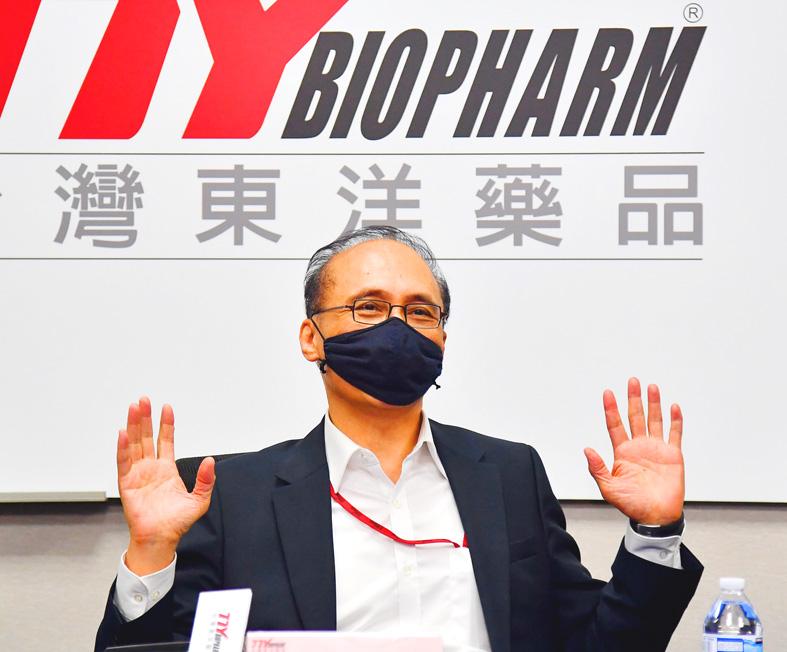TTY Biopharm Co Ltd (台灣東洋藥品) chairman Lin Chuan (林全) yesterday refuted rumors that the company had engaged in insider trading ahead of last month’s announcement that it had won conditional rights to market Bio-NTech SE’s COVID-19 vaccine in Taiwan.
Lawmakers on Monday said they suspected that the firm was involved in insider trading, as 2,414 TTY units were traded on the Taipei Exchange on Oct. 12, surging 6.6 times from an average daily trading volume of 365 units in September.
TTY said that it had secured authorization to market the vaccines after the market closed on the same day.

Photo: CNA
The firm’s share price spiked from NT$69.5 to NT$84.3 on Oct. 15, when a total of 30,108 units were traded, before gradually falling to NT$82.2 on Monday last week, with a total 10,725 units traded, one day before TTY said it had terminated its bid to gain Bio-NTech’s authorization to market the vaccine.
The transactions must have been done by someone with insider information, Chinese Nationalist Party (KMT) Legislator William Tseng (曾銘宗) said on Monday.
“I never conducted any insider trading as I despise the behavior. I would welcome any investigation,” Lin told a news conference in Taipei.
“However, there indeed was a chance that someone conducted the insider trading, as the trading volume on Oct. 12 was too high to be normal,” Lin said.
TTY noticed the abnormal trading activity late on Oct. 12 and ran a preliminary investigation before notifying the exchange on Oct. 15, general manager Robbin Shih (施俊良) told a media briefing.
In addition to TTY employees, some officials at the Centers for Disease Control (CDC), Bio-NTech staff and local agents of China-based Shanghai Fosun Pharmaceutical Co (上海復星醫藥) were involved in the negotiations and knew TTY’s intention to introduce the vaccines, Shih said.
“I highly doubt that it was outside people who conducted the illegal trading, but I would not know who they were. I hope that prosecutors can get to the bottom of it soon,” Lin said.
TTY’s move to abandon the bid to market the vaccine in Taiwan gained attention, as the Bio-NTech and Pfizer Inc-developed vaccine had shown 90 percent effectiveness in preventing COVID-19, prompting speculation that TTY had failed to reach an agreement due to political concerns.
Lin said that TTY stopped trying to acquire the rights as the number of vaccines the CDC intends to purchase was much less than TTY’s expectations, which made the negotiations between TTY and Bio-NTech difficult.

CHIP WAR: Tariffs on Taiwanese chips would prompt companies to move their factories, but not necessarily to the US, unleashing a ‘global cross-sector tariff war’ US President Donald Trump would “shoot himself in the foot” if he follows through on his recent pledge to impose higher tariffs on Taiwanese and other foreign semiconductors entering the US, analysts said. Trump’s plans to raise tariffs on chips manufactured in Taiwan to as high as 100 percent would backfire, macroeconomist Henry Wu (吳嘉隆) said. He would “shoot himself in the foot,” Wu said on Saturday, as such economic measures would lead Taiwanese chip suppliers to pass on additional costs to their US clients and consumers, and ultimately cause another wave of inflation. Trump has claimed that Taiwan took up to

A start-up in Mexico is trying to help get a handle on one coastal city’s plastic waste problem by converting it into gasoline, diesel and other fuels. With less than 10 percent of the world’s plastics being recycled, Petgas’ idea is that rather than letting discarded plastic become waste, it can become productive again as fuel. Petgas developed a machine in the port city of Boca del Rio that uses pyrolysis, a thermodynamic process that heats plastics in the absence of oxygen, breaking it down to produce gasoline, diesel, kerosene, paraffin and coke. Petgas chief technology officer Carlos Parraguirre Diaz said that in

Japan intends to closely monitor the impact on its currency of US President Donald Trump’s new tariffs and is worried about the international fallout from the trade imposts, Japanese Minister of Finance Katsunobu Kato said. “We need to carefully see how the exchange rate and other factors will be affected and what form US monetary policy will take in the future,” Kato said yesterday in an interview with Fuji Television. Japan is very concerned about how the tariffs might impact the global economy, he added. Kato spoke as nations and firms brace for potential repercussions after Trump unleashed the first salvo of

SUPPORT: The government said it would help firms deal with supply disruptions, after Trump signed orders imposing tariffs of 25 percent on imports from Canada and Mexico The government pledged to help companies with operations in Mexico, such as iPhone assembler Hon Hai Precision Industry Co (鴻海精密), also known as Foxconn Technology Group (富士康科技集團), shift production lines and investment if needed to deal with higher US tariffs. The Ministry of Economic Affairs yesterday announced measures to help local firms cope with the US tariff increases on Canada, Mexico, China and other potential areas. The ministry said that it would establish an investment and trade service center in the US to help Taiwanese firms assess the investment environment in different US states, plan supply chain relocation strategies and